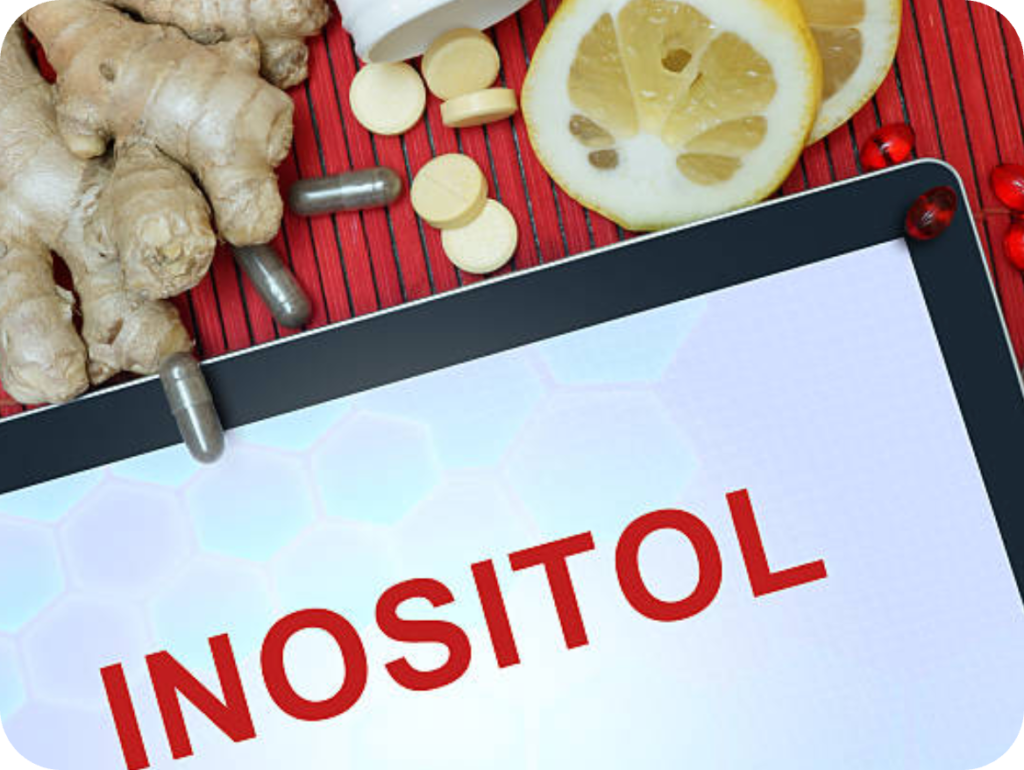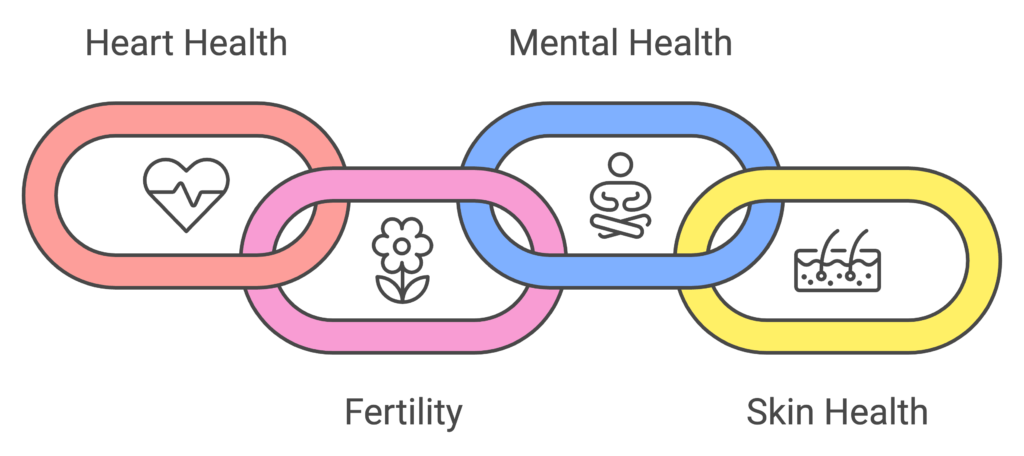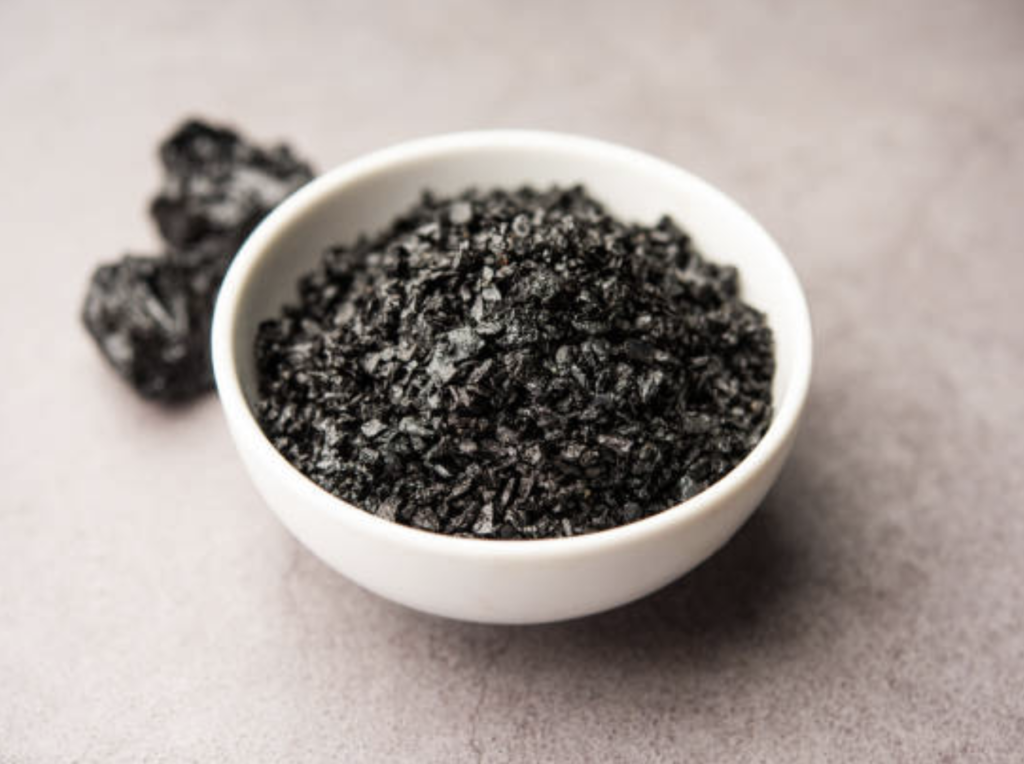Inositol for Weight Loss: Benefits, Dosage, and Uses
Weight management can be a complex journey, especially for those with underlying hormonal imbalances or metabolic conditions. Inositol, often dubbed a “natural sugar,” has gained popularity for its potential benefits in addressing hormonal health and assisting weight loss efforts. This article will dive deep into the connection between inositol and weight loss, especially for those managing PCOS, and the differences between myo-inositol and other inositol forms.

What is Inositol?
Inositol is a carbohydrate compound naturally found in foods like fruits, beans, and grains. It plays a vital role in cell signaling and insulin regulation, making it an essential nutrient for metabolic and hormonal health.
Forms of Inositol
- Myo-inositol: The most common and biologically active form, particularly effective in managing PCOS symptoms and improving insulin sensitivity.
- D-chiro-inositol: Often combined with myo-inositol for enhanced benefits in hormonal regulation and metabolism.
How Inositol Aids Weight Loss
1. Improves Insulin Sensitivity
Insulin resistance is a common barrier to weight loss, especially for individuals with PCOS. Inositol improves insulin sensitivity, reducing the body’s tendency to store fat and promoting fat burning.
2. Regulates Hormonal Imbalances
For those with PCOS, hormonal imbalances can lead to weight gain. Inositol helps restore hormonal harmony by reducing excess androgens and improving ovarian function, which can indirectly support weight management.
3. Reduces Cravings
Improved insulin regulation can also stabilize blood sugar levels, curbing hunger and reducing the likelihood of binge eating.
4. Supports Mental Well-being
Stress and anxiety are often linked to weight gain. Inositol has calming effects on the nervous system, promoting better emotional regulation and reducing stress-related eating.
Inositol and PCOS Weight Loss
Why Inositol is Effective for PCOS
PCOS affects 1 in 10 women and is often accompanied by symptoms like weight gain, insulin resistance, and difficulty losing weight. Myo-inositol and D-chiro-inositol work synergistically to target the root causes of PCOS-related weight gain by improving insulin sensitivity and hormonal balance.
Studies Supporting Inositol for PCOS
Research has shown that women with PCOS who take inositol supplements experience:
- Reduced waist circumference.
- Lower BMI.
- Improved ovulation and menstrual regularity.
Myo-Inositol and Weight Loss: What Makes It Special?
Myo-inositol is a game-changer for weight loss due to its powerful metabolic effects. It enhances the body’s ability to metabolize glucose, leading to reduced fat storage. Combined with a healthy diet and exercise, it can accelerate weight loss results.
Dosage Guidelines for Inositol Weight Loss
General Recommendations
- Myo-inositol dosage: 2,000 mg to 4,000 mg per day, divided into two doses.
- Combination with D-chiro-inositol: Typically, a 40:1 ratio of myo-inositol to D-chiro-inositol is recommended.
How to Take Inositol
- Take inositol with meals to improve absorption and reduce the risk of gastrointestinal discomfort.
- Use inositol powder or capsules based on personal preference.
Duration for Results
Consistent use for 3-6 months is often required to see significant weight loss benefits. Pairing inositol supplementation with a healthy lifestyle enhances results.
Comparing Inositol with Other Weight Loss Supplements
- Inositol vs. Berberine: While both improve insulin sensitivity, inositol has fewer side effects and is better tolerated.
- Inositol vs. Metformin: Inositol is a natural alternative to metformin, offering similar benefits with fewer gastrointestinal issues.
Frequently Asked Questions
1. Can men use inositol for weight loss?
Yes, while inositol is popular among women with PCOS, men can also benefit from its insulin-sensitizing effects, making it a great option for weight loss and overall metabolic health.
2. Are there side effects of taking inositol?
Inositol is generally well-tolerated. Mild side effects, like nausea or bloating, may occur in some individuals, especially when taken in high doses.
3. Does inositol interact with medications?
Consult a healthcare provider if you’re taking medications for diabetes or hormonal imbalances, as inositol may enhance their effects.
4. Can I Get Inositol Naturally From Food?
Foods like cantaloupe, oranges, beans, and nuts are natural sources of inositol. However, therapeutic doses are challenging to achieve through diet alone.
5. Is Inositol Safe for Long-Term Use?
Yes, inositol is considered safe for long-term use when taken at recommended dosages.
6. How long does it take to see results with inositol?
Most people notice improvements in energy, mood, or menstrual regularity within 4–6 weeks. Weight loss results can take longer, often 2–3 months, as the body adjusts to improved insulin sensitivity.
7. Can I combine inositol with other weight loss supplements?
Yes, but consult a healthcare provider to ensure there are no interactions. Many people pair inositol with supplements like chromium, berberine, or omega-3 fatty acids for enhanced metabolic support.
Tips for Maximizing Inositol Benefits
- Combine with a Balanced Diet: Focus on whole foods, lean proteins, and healthy fats.
- Stay Active: Incorporate regular exercise, such as walking, yoga, or strength training.
- Stay Hydrated: Proper hydration supports metabolism and the effectiveness of inositol.
- Pair with Other Supplements: Consider pairing inositol with omega-3 fatty acids or vitamin D for added benefits.
Benefits Beyond Weight Loss

Inositol offers a wide range of health benefits:
Heart Health: Lowers cholesterol levels and supports cardiovascular health.
Improved Fertility: Supports egg quality and ovulation.
Mental Health: Reduces symptoms of anxiety and depression.
Skin Health: Helps reduce acne caused by hormonal imbalances.
Conclusion
Inositol, especially in the form of myo-inositol and D-chiro-inositol, offers a science-backed approach to supporting weight loss, particularly for those with hormonal or metabolic challenges like PCOS. By improving insulin sensitivity, regulating hormones, and reducing cravings, inositol creates a strong foundation for sustainable weight management. Combined with a healthy lifestyle, it can be a game-changer for achieving your weight loss goals.
Whether you’re exploring inositol for weight loss, using it to address PCOS symptoms, or simply curious about its metabolic benefits, this natural compound has much to offer. As always, consult a healthcare professional before starting any new supplement regimen. PCOS patients may find additional benefits from PCOS Weight Loss Supplements.
LDN can be an alternative to Inositol in some cases. Learn more about LDN for weight loss.


